BusinessEurope Headlines No. 2019-04
Only a strong EU can respond to global challenges
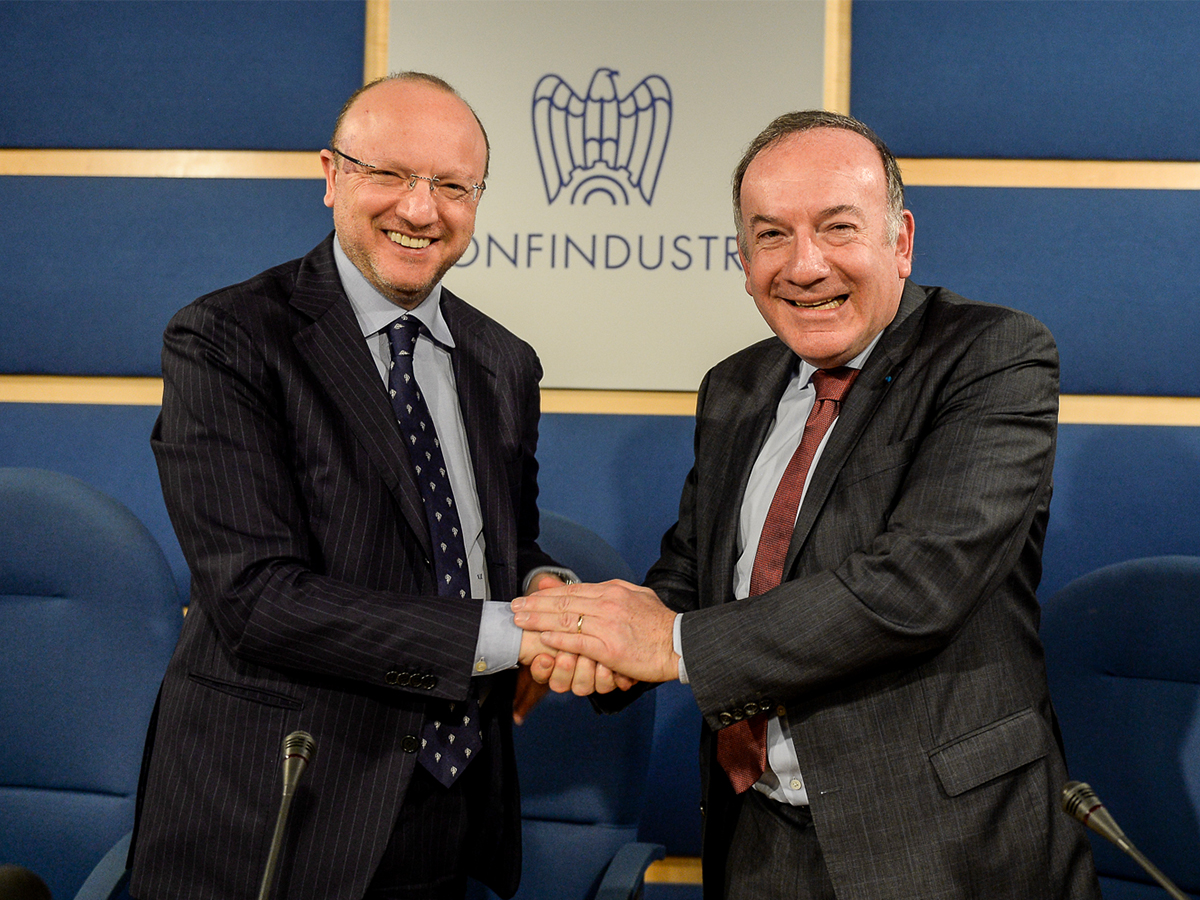
BusinessEurope and its Italian member federation Confindustria presented the European business community’s “Ambition for 2030 – A Europe with opportunities for all” on 31 January in Rome. This was the first of a series of activities that BusinessEurope is taking ahead of the European elections in May 2019. “The European project brought us 70 years of peace and prosperity. This is a great achievement but it isn’t sufficient anymore for today’s challenges. European business believes we need a stronger European Union to remain in the driving seat at global level and shape the direction of change according to our values. We must maintain our ground towards giants like the US and China”, said President Pierre Gattaz. He also passed a similar message at the Coatings Summit in Paris on 31 January.
![]() Contact: Daniele Olivieri
Contact: Daniele Olivieri
Video message on the social partners work programme 2019-2021
Representatives of the European social partners talk about the topics that they will jointly work on over the next three years, including digitalisation; skills; addressing psycho-social aspects and risks at work; capacity-building for a stronger social dialogue; and circular economy. See the pictures of the signing ceremony of the new work programme.
President Gattaz discusses innovation at EU industry days
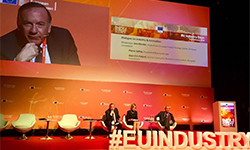 “Innovation is key to modern economies. Today, more than ever, there is an acceleration of the global innovation race. This is both an opportunity and a threat”, said President Pierre Gattaz during the EU Industry Days 2019 at the European Commission on 6 February. In a discussion with Jean-Eric Paquet, Commission’s Director General for Research and Innovation, Gattaz explained the role of industry in transforming the economy and society: “Companies not only provide jobs and purchasing power, but also invest in research and innovation as nobody else does”. He also emphasised the importance of developing a strong EU innovation policy, to put Europe on top of the game with societal challenges such as climate change.
“Innovation is key to modern economies. Today, more than ever, there is an acceleration of the global innovation race. This is both an opportunity and a threat”, said President Pierre Gattaz during the EU Industry Days 2019 at the European Commission on 6 February. In a discussion with Jean-Eric Paquet, Commission’s Director General for Research and Innovation, Gattaz explained the role of industry in transforming the economy and society: “Companies not only provide jobs and purchasing power, but also invest in research and innovation as nobody else does”. He also emphasised the importance of developing a strong EU innovation policy, to put Europe on top of the game with societal challenges such as climate change.
Contact: Carolina Vigo
Supporting business in Russia through an open communication channel
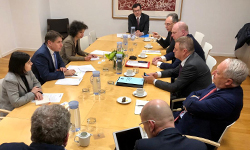 On the occasion of the annual visit of the Association on European Business (AEB) in Russia, BusinessEurope met with members of the AEB Board on 4 February and had the opportunity to discuss on recent developments in EU-Russia trade and economic relations as well as the business climate in Russia. Although bilateral trade has increased over the past year, the lack of reforms in the economy as well as the adoption of import-substitution policies from the part of Russia render the environment for trade and new investments challenging. The picture becomes more obscure when one also adds broader concerns on the potential impact of unilateral, secondary U.S. sanctions. European businesses that are present in Russia seek support, especially at technical level, to deal with an increasing amount of complex regulations that do not often follow European or international standards. For this reason, it is important to maintain an effective dialogue with the relevant Russian and Eurasian Economic Union authorities.
On the occasion of the annual visit of the Association on European Business (AEB) in Russia, BusinessEurope met with members of the AEB Board on 4 February and had the opportunity to discuss on recent developments in EU-Russia trade and economic relations as well as the business climate in Russia. Although bilateral trade has increased over the past year, the lack of reforms in the economy as well as the adoption of import-substitution policies from the part of Russia render the environment for trade and new investments challenging. The picture becomes more obscure when one also adds broader concerns on the potential impact of unilateral, secondary U.S. sanctions. European businesses that are present in Russia seek support, especially at technical level, to deal with an increasing amount of complex regulations that do not often follow European or international standards. For this reason, it is important to maintain an effective dialogue with the relevant Russian and Eurasian Economic Union authorities.
Contact: Sofia Bournou
Private sector is key for EU-Africa relations
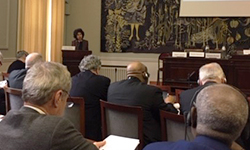 “The negotiation of the Post-Cotonou Partnership Agreement is an opportunity to create a political framework for future EU-Africa relations that takes account of the central role the private sector needs to play to leverage the investments necessary for reaching the Sustainable Development Goals”, said Luisa Santos, BusinessEurope Director for International Relations, in her keynote address at the conference Euro-African Partnerships Post-Cotonou: What goals? What instruments?. Organised by the INEADEC institute, the event took place at the Belgian Senate on 6 February. It brought together representatives from the European Institutions, EU Member States, African governments, the private sector, academia, civil society, and institutions working on international cooperation to discuss the future EU-Africa partnership and the necessary framework conditions for increased economic relations between the two continents. “The private sector can only scale up investment if the right policy environment is in place. Improving the business and investment climate will thus be key for increasing investment in Africa and achieving a true partnership of equals.”
“The negotiation of the Post-Cotonou Partnership Agreement is an opportunity to create a political framework for future EU-Africa relations that takes account of the central role the private sector needs to play to leverage the investments necessary for reaching the Sustainable Development Goals”, said Luisa Santos, BusinessEurope Director for International Relations, in her keynote address at the conference Euro-African Partnerships Post-Cotonou: What goals? What instruments?. Organised by the INEADEC institute, the event took place at the Belgian Senate on 6 February. It brought together representatives from the European Institutions, EU Member States, African governments, the private sector, academia, civil society, and institutions working on international cooperation to discuss the future EU-Africa partnership and the necessary framework conditions for increased economic relations between the two continents. “The private sector can only scale up investment if the right policy environment is in place. Improving the business and investment climate will thus be key for increasing investment in Africa and achieving a true partnership of equals.”
Contact: Benedikt Wiedenhofer
Civil society and business should cooperate more on circular economy
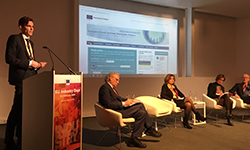 The Circular Economy Stakeholder Platform of the European Commission and the European Economic and Social Committee (EESC) is an effective mean for stakeholders across the board to discuss how to progress on Europe’s circular economy agenda. “Such a conversation is crucial for BusinessEurope and its membership. Through the Circular Economy Industry Platform, businesses have shown through more than 150 examples of how it wants adds to this agenda, but also what challenges it faces”, said BusinessEurope’s Industrial Affairs Adviser Leon de Graaf at the EU Industry Days on 6 February in a panel dedicated to the role of civil society in defining sustainable EU industrial policy priorities. He added that “we need civil society to think with business on how to create a functioning market for secondary raw materials, which is crucial to make the business case”. De Graaf pointed out that more funds must be dedicated to the research, development and deployment of circular designs that promote recycling, reuse and reduce consumption of critical raw materials. It also requires more focus on the demand-side signals, as the consumer at the end of the day has to be willing to buy those new products.
The Circular Economy Stakeholder Platform of the European Commission and the European Economic and Social Committee (EESC) is an effective mean for stakeholders across the board to discuss how to progress on Europe’s circular economy agenda. “Such a conversation is crucial for BusinessEurope and its membership. Through the Circular Economy Industry Platform, businesses have shown through more than 150 examples of how it wants adds to this agenda, but also what challenges it faces”, said BusinessEurope’s Industrial Affairs Adviser Leon de Graaf at the EU Industry Days on 6 February in a panel dedicated to the role of civil society in defining sustainable EU industrial policy priorities. He added that “we need civil society to think with business on how to create a functioning market for secondary raw materials, which is crucial to make the business case”. De Graaf pointed out that more funds must be dedicated to the research, development and deployment of circular designs that promote recycling, reuse and reduce consumption of critical raw materials. It also requires more focus on the demand-side signals, as the consumer at the end of the day has to be willing to buy those new products.
Contact: Leon de Graaf
Experts discuss sustainable finance and the “taxonomy” approach
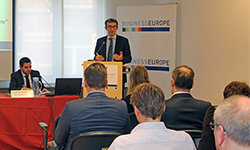 Around 90 experts from different sectors and fields discussed sustainable finance and the “taxonomy” approach at a BusinessEurope event on 7 February. Martin Spolc, Head of Unit at the European Commission Directorate‑General for Financial Stability, Financial Services and Capital Markets Union (DG FISMA), and high level experts from the Technical Expert Group, talked about the “taxonomy” proposal features and the different dimensions of the foreseen technical screening criteria. While there was broad support for the European Commission’s objective to channel capital flows towards sustainable activities, some speakers highlighted that the taxonomy and its scope need to be carefully designed and its criteria has to be practicable, proportionate and do not lead to any sort of “brown”/or black listing.
Around 90 experts from different sectors and fields discussed sustainable finance and the “taxonomy” approach at a BusinessEurope event on 7 February. Martin Spolc, Head of Unit at the European Commission Directorate‑General for Financial Stability, Financial Services and Capital Markets Union (DG FISMA), and high level experts from the Technical Expert Group, talked about the “taxonomy” proposal features and the different dimensions of the foreseen technical screening criteria. While there was broad support for the European Commission’s objective to channel capital flows towards sustainable activities, some speakers highlighted that the taxonomy and its scope need to be carefully designed and its criteria has to be practicable, proportionate and do not lead to any sort of “brown”/or black listing.
Contact: Asdin El Habassi
Calendar
- 18-19 February: Competitiveness Council
- 19 February: BusinessEurope conference: What do SMEs expect from the future EU SME policy?
- 19 February: BusinessEurope event: Taxation of the digitalised economy: analysing the OECD approach
Reminder: please take a look at our revised privacy policy